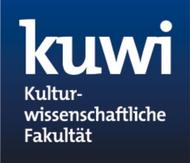Events and news
On Political Liminality: Serbia’s Student Protests and the Remapping of Political Space

November 5
1-2 pm (s.t.)
GD 102 and via livestream
Stefan Janković: On Political Liminality. Serbia's Student Protests and the Remapping of Political Space
In cooperation with with the Viadrina Center B/ORDERS IN MOTION
Moderation: PD Dr. Carolin Leutloff-Grandits (Viadrina Center B/ORDERS IN MOTION)
Since November 2024, student-led protests sparked by a fatal collapse at the Novi Sad train station have become one of the most significant mobilizations in Serbia’s recent history, pressing for accountability, transparency, and democratic reforms. Over the past year, joined by teachers, high school pupils, and citizens, students have used blockades, strikes, and occupations of media buildings and squares, supported by decentralized networks of coordination, to sustain pressure on state institutions. Whereas the government’s response has oscillated between repression and attempts at delegitimization, the movement’s tactics have shown remarkable persistence and adaptability, posing a serious test for how we conceptualize political mobilization. This lecture approaches the student movement through the lens of political liminality, emphasizing its capacity to distort the legitimate politics. By tracing the material infrastructures of blockades and occupations, we argue that students reconfigured flows, sites, and publics, enacting fragile but concrete re-territorializations of the political space.
The lecture will be held in English.
Opening of the Lecture Series 'Beyond Sustainability: Humanities and Social Sciences Perspectives on the Ecological Crisis'

October 27
4:15-5:45 pm,
room AM 233 and online
Opening of the Lecture Series "Beyond Sustainability: Humanities and Social Sciences Perspectives on the Ecological Crisis", winter semester 2025/26, mondays, 4:15-5:45 pm, room AM 233 and online. This lecture will be held online, listeners are welcome to attend in person.
Jason Moore: On the 'Sustainability of the Rich'. How the One Percent uses Nature to Make You Afraid, Keep its Wealth, and Hold on to Power
In this lecture, environmental historian Jason W. Moore exposes the "climate hoax" at the heart of contemporary sustainability politics, arguing that the planetary elite-the Point One Percent-exploits genuine biospheric crises to safeguard their wealth and power while imposing austerity on the masses. Drawing on historical patterns from the Little Ice Age to the 1960s environmental revival, Moore reveals how ruling classes have repeatedly invoked "Nature" during moments of social unrest to justify repression, enclosure, and technocratic control. Far from an anthropogenic disaster, the climate crisis is capitalogenic, driven by capitalism's relentless quest for Cheap Nature-a system now faltering amid agricultural stagnation, overaccumulation, and political instability. Moore critiques both climate maximalists, who hype apocalyptic doom to demand emergency rule, and minimalists, who down play impacts in favour of techno-market fixes, as two sides of the same elite coin. Instead, he indicts the eco-industrial complex as a mechanism for greenwashing monopoly capitalism. Yet, there's opportunity in the chaos: climate disruption weakens elite grip, opening doors for mass movements to reclaim the web of life for the working-class majority. Rejecting fearmongering and the authoritarianism of climate emergency politics, he calls for a radical reframing: democratising the web of life and reclaiming power from the bankers, Tech Bros, and warmongers.
Jason W. Moore teaches world environmental history at Binghamton University, USA, where he coordinates the World-Ecology Research Collective. He hates war, loves the working class, and looks forward to the day when the expropriators are expropriated. Recent books include L'écologie-monde ducapitalism (2024), Oltre la giustiziaclimatica (2024), La gran implosion: Clase, imperio y crisis climática en el capitalismozombi (2025), and with Raj Patel, A History of the World in Seven Cheap Things (2017). The tenth anniversary edition of Capitalism in the Web of Life will be published later this year. His books and essays on class, capital, and empire in the web of life have been awarded the Alice Hamilton Prize in environmental history, the Byres and Bernstein Prize in agrarian studies, the Braverman Prize in labour studies, and the Immanuel Wallerstein Award. A prolific writer and speaker, Moore's interviews, lectures, and essays can be found in over 20 languages on his website: https://jasonwmoore.com/.
Beyond Sustainability: Humanities and Social Sciences Perspectives on the Ecological Crisis

Lecture Series, winter semester 2025/26
Mondays, 4:15-5:45 pm, room AM 233 and online via Zoom
Conveners: Amelie Kutter and Estela Schindel
Climate change, extractivist devastation, ocean acidification, and the accelerating loss of species continue to worsen worldwide, with environmental damage intensifying across the globe. As the ecological crisis deepens, the humanities and social sciences are called upon to develop resources — conceptual, analytical, and methodological — in order to make sense of the current situation and to respond to its challenges. The concept of sustainability — once central to environmental discourse — has been criticized for its association with technocratic, managerial, and neoliberal agendas that fail to address the structural, historical, and cultural dimensions of environmental degradation. At the same time, the crisis demands more than critique: it calls for innovative ways of thinking, organizing, and acting that engage with the social, political, ethical, and symbolic foundations of human-environment relations. This interdisciplinary lecture series brings together scholars from across the humanities and social sciences to examine the ecological crisis from diverse and complementary angles, including critical sustainability studies, decolonial ecologies, environmental justice, or posthumanist theory. By bringing these perspectives in dialogue, the lecture series aims to push the debate beyond sustain ability, toward new ways of thinking and acting in the face of ecological transformation.
All lectures will be held in English. Find the detailed program here: poster / flyer with abstracts.
Border controls at the Oder: Legal, political and humanitarian challenges

17 July
6:15-7:45 pm
Senatssaal (HG 109) and livestream via Zoom
Registration: https://forms.europa-uni.de/form/alias/EUV/grenzkontrollen-research-factory/. After registering, you will receive the link to the livestream by e-mail.
Border controls at the Oder: Legal, political and humanitarian challenges
(The event will be held in German. Simultaneous translation into English and Spanish will be available in the livestream.)
An event organised by the Viadrina Center B/ORDERS IN MOTION in cooperation with the European Reform University Alliance (ERUA) and the Viadrina Institute for European Studies (IFES).
Panel discussion with Marcus Engler (German Centre for Integration and Migration Research DeZIM), Lea Christinck (German Centre for Integration and Migration Research DeZIM) and Norbert Cyrus (Viadrina Center B/ORDERS IN MOTION), who have presented a current expertise on the effects of internal border controls, as well as Claudia M. Hofmann (Chair of Public Law and European Social Law with a focus on interdisciplinary social law research, EUV), Viadrina's European and social law expert, and Anja Hennig (Chair for Comparative Politics, EUV), specialist in German-Polish relations at the EUV. Moderation by Kira Kosnick (Viadrina Center B/ORDERS IN MOTION).
Two federal governments have introduced controls at Germany's external borders in several stages since autumn 2023. On 7 May 2025, the federal police were also instructed to push back asylum seekers. The Berlin Administrative Court ruled that the pushback of three refugees at the German-Polish border was unlawful in a decision on 2 June 2025. The situation in Frankfurt (Oder), where two stationary border checkpoints were set up, is the focus of public attention. Here, the three asylum seekers, whose pushback was judged to be unlawful, had tried in vain to apply for asylum. In the meantime, the Polish government has also announced the temporary introduction of controls at the border with Germany and Lithuania from 7 July 2025.
The panel discussion will categorise these developments and measures, particularly with regard to the rule of law and proportionality. Statements on the effectiveness of internal border controls as a means of reducing irregular entries and smuggling will be examined and contrasted with the negative effects on the border region, refugee protection and German-Polish relations.
A recording of the event and a review on the Viadrina news portal are now available online.
Lunch Lecture: Global trade war? International politics and capitalism in crisis

18 June
1-2 pm
GD 102
Global trade war? International politics and capitalism in crisis
IFES Lunch Lecture with Jürgen Neyer (European and International Politics / EUV) and Sascha Münnich (Sociology of Economics / EUV), moderated by Sonja Priebus (Europa-Studien / EUV).
In this lunchtime discussion, Jürgen Neyer (Professor of European and International Politics) and Sascha Münnich (Professor of the Sociology of Economics) will talk about the political and socio-economic aspects of the recent increase in protectionism and the escalation of trade policy conflicts between the USA, China and the EU. The discussion will analyse the causes and consequences of recent and expected tariff battles on the institutional design of transnational value chains, the financial system, and national economic and trade policy orientation. In addition, the question arises as to the political constellations at national and international level, and the interaction of these constellations in promoting or defusing escalations. Is the crisis a restoration or reorganisation of international (economic) policy, and what do these developments mean for ecological and digital transformation?
The discussion will be held in German. Questions can be asked in English. You are welcome to bring your own brown-bag lunch.
A recording of the event and a review on the Viadrina Newsportal are now available online.
Poland votes and Europe watches. What is at stake?

On May 9, 2025, before the first round, IFES member Anja Hennig discussed the upcoming presidential elections in Poland and everything related to them with the journalist Jan Opielka and the moderator Carla Sappok (Speakers-Pool Team EUROPE DIRECT of the European Commission) at the Protestant Academy in Frankfurt am Main. Among the topics discussed were the situation of the rule of law, security, migration and economic policy, the Catholic Church and its influence on moral policy and education, as well as demographic factors and social attitudes.
"Human and Planet" Talk Series
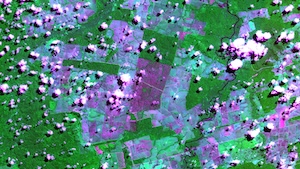
The Human and Planet Talk Series aims to provide a platform for teaching, research and transfer on issues related to the socio-ecological crisis and climate change in a multidisciplinary and broad perspective. Based at the Viadrina Institute for European Studies, this open series welcomes contributions from colleagues and students interested in topics including but not limited to
- Global warming and climate change: social, economic and political dimensions
- Environmental disasters: loss of biodiversity, ocean acidification, changes in hydrological cycles (floods, droughts, dying rivers)
- Sustainability, mitigation & adaptation, de-growth: the diversity of frameworks aimed at addressing the current crisis at the levels of politics and civil society
- Extractivism, capitalism and global North-South inequalities
- Human-nature and/or culture-nature dualism: historical, anthropological and philosophical approaches
- The Anthropocene in the humanities, literature and the arts: ecocriticism and the search for languages for nature crisis and loss.
This series provides a permanent but flexible format for ongoing reflection and exchange on teaching and research on these topics. We are happy to co-organise related activities, to host reading groups and seminars, and to serve as a hub for connecting projects from the Viadrina.
Dates in the summer semester 2025:
03.07.2025, 11 am-1:15 pm: How to research about Rights of Nature? Accounts from the field by advanced and graduated master students
With MA Moritz Wiegand, Alba Trabandt and Valeria Florez. Session as part of the seminar “Rights of Nature from the Global South to Europe: Practices, Cosmovisions, Policies” conducted by Anja Hennig and Estela Schindel.
02.07.2025, 6:15-7:45 pm, HG 217: Paradise Lost? Art facing the Anthropocene
Pierre Wat (Paris/EUV)
09.05.2025, 6:30-8:00 pm: The Reality of Ghosts: Haunted Landscapes in the Anthropocene
Juliane Rebentisch (Hamburg/Princeton)
Dates in the winter semester 2024/25:
27.11.2024, 5:30-6:30 pm: Climate protection after Baku: Reimund Schwarze in conversation
Reimund Schwarze (Helmholtz Centre for Environmental Research)
17.12.2024, 4:15-5:30 pm: Reflections on the Past and Future of the Kakhovka Hydropower Plant Area (KHPP)
Tetiana Gardashuk (National Academy of Sciences of Ukraine), in cooperation with the Competence Network Interdisciplinary Ukraininan Studies (KIU)
6.01.2025, 4:15-5:45 pm: European Values in the EU's Developmental, Energy and Climate Policies
Randall Halle (Pittsburgh University), in cooperation with the Jean Monnet Policy Network ValEUs
Juliane Rebentisch: The Reality of Ghosts: Haunted Landscapes in the Anthropocene
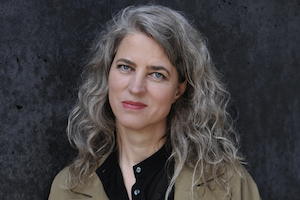
09 May
6:00-7:00 pm
Logensaal, LH 011
Juliane Rebentisch: The Reality of Ghosts: Haunted Landscapes in the Anthropocene
A keynote lecture in english by Juliane Rebentisch (Hamburg/Princeton) at the conference "Realisms of Relations. Ecologies of Art in the Aftermath of Modernity" of the Junior Professorship for Theory of Arts and Media and in cooperation with the IFES "Human and Planet" Talk Series.
One way in which people today realize their relations to non-human beings is through the recognition of their absence. The uncanny feeling that there is „nothing where there should be something“ (Mark Fisher) corresponds to a perception of landscapes as haunted by overlaying histories of violence. A sensitivity to the ghosts of the Anthropocene – to the signs of past forms of life – corresponds to an impulse not to forget and to confront loss in the age of mass extinction. The lecture will examine the realist twist on the motif of haunting in ecocritical discourse and discuss its consequences for a politics of mourning.
Juliane Rebentisch is Professor of Philosophy at Hochschule für bildende Künste Hamburg. From 2014 to 2024, she was a member of the Research Council at the Frankfurt Institute for Social Research, with which she is now associated as a Permanent Fellow. Since 2019, she is a Regular Visiting Professor at the German Department of Princeton University. She held the office of President of the German Society for Aesthetics from 2015 – 2018. In 2017, she was awarded the Lessing Prize of the Free and Hanseatic City of Hamburg. Publications include: Aesthetics of Installation Art (Sternberg 2012); The Art of Freedom. On the Dialectics of Democratic Existence (Polity 2016); Theorien der Gegenwartskunst zur Einführung (Junius 2013); Der Streit um Pluralität. Auseinandersetzungen mit Hannah Arendt (Suhrkamp 2022).
Brandenburg after the federal election: Analysis and outlook
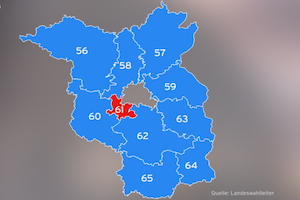
29 April
6:15-7:45 pm
Senatssaal, HG 109
Brandenburg after the federal elections: Analysis and outlook
Panel discussion in German with:
Gideon Botsch (Universität Potsdam)
Tom Leistner (Projektleiter „Wir sind der Osten“)
Theresa Gessler (EUV)
Moderation: Susann Worschech (EUV)
In the federal election on 23 February 2025, the AfD emerged as the strongest political force in Brandenburg, a party that represents xenophobic or even racist, anti-scientific and anti-democratic positions. Beyond the consequences at federal level, this raises questions that affect Brandenburg as a place of work and learning: what does this election mean for our city and our university? With a view to the possible causes of this result, but above all to the future prospects for the state, city and university, the IFES invites to a discussion.
Reimund Schwarze: Plea for a holistic climate policy (in German)
 "Perhaps the greatest fallacy of current climate policy is the misleading assumption that the climate crisis can be overcome by technical solutions alone and without involving nature." (Reimund Schwarze, 10.03.2025)
"Perhaps the greatest fallacy of current climate policy is the misleading assumption that the climate crisis can be overcome by technical solutions alone and without involving nature." (Reimund Schwarze, 10.03.2025)
In his "Plea for a holistic climate policy and a reorganisation of competencies in the new German government", professor Reimund Schwarze advocates climate protection that focuses not only on technical solutions but also on nature-based solutions and their immediate potential, as well as taking the principles of a just energy transition seriously in international, national and local climate policy. Schwarze concludes his plea with concrete reform proposals for national and international policy.
The political systems in Eastern Europe: institutions, actors and processes
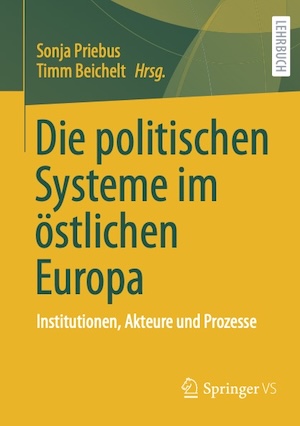
The book offers a comparative presentation of the political systems of the states of Eastern Europe, i.e. all states in Central, Eastern and South-Eastern Europe. The 22 country chapters describe and analyse central institutions such as parliament, government, president and the electoral system. In order to take into account the strong dynamics of transformation and post-transformation, the social and historical embedding of the institutions is also analysed.
The book has been edited by Sonja Priebus and Timm Beichelt, published by Springer VS and is aimed at students of political science and anyone interested in the dynamic political developments in Eastern Europe.
Annual Report 2024
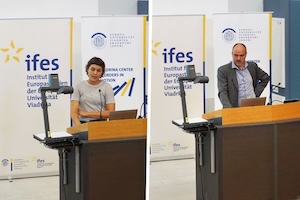
The relaunch of the Working Paper Series, the start of the Talk Series "Human & Planet", including lectures on the COP29 and reflections on the value of rivers in the context of the Russian war of aggression in Ukraine, as well as other public events and contemporary analyses, including events to mark the 40th anniversary of Michel Foucault's death and on the ongoing border controls on the German-Polish border and their impact on Frankfurt (Oder) and the elections in the USA - these were the topics of activities at IFES last year.
Randall Halle: European Values in the EU's Developmental, Energy and Climate Policies
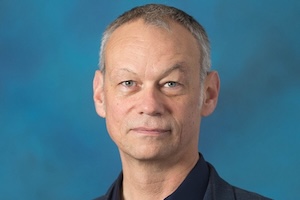
6 January
4:15-5:45 pm
online, Zoom
Randall Halle: European Values in the EU's Developmental, Energy and Climate
Policies
In cooperation with the Research and Education Network on Contestations to EU Foreign Policy ValEUs, the event takes place as part of the IFES "Human and Planet" Talk Series and the ValEUs Lecture Series. It combines interdisciplinary approaches to critically evaluate EU foreign policy with a special focus on its foundational set of principles, its contestations and emerging conflicts. In his lecture, Randall Halle will discuss the values conveyed in recent environmental policies of the European Union.
Randall Halle is an associated IFES member and Klaus W. Jonas Professor of German Film and Cultural Studies as well as director of the European Studies Center at the University of Pittsburgh.
Tetiana Gardashuk: Reflections on the Past and Future of the Kakhovka Hydropower Plant Area (KHPP)
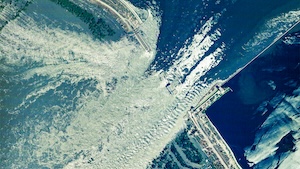
17. Dezember
16:00-18:00 Uhr (c.t.)
AM 203, Auditorium Maximum
Tetiana Gardashuk: Reflections on the Past and Future of the Kakhovka Hydropower Plant Area (KHPP)
In this lecture, the Ukrainian scholar Tetiana Gardashuk (National Academy of Sciences of Ukraine/ KIU) explores the multiple roles of rivers, the historical, economic and cultural context of hydropower development, and dam building with a special focus on the case of the Dnipro Hydropower Cascade, which is part of the Kakhovka Hydropower Plant (KHPP), that was destroyed on June 6, 2023, in one of the biggest russian war crimes in Ukraine. The possible scenarios for the future of the area will be outlined. The event is part of the "Human and Planet" Talk Series.
Climate protection after Baku (hybrid)
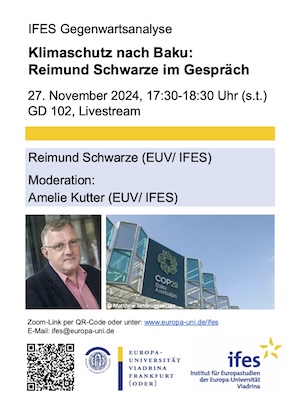
27 November
5:30-6:30 pm
GD 102, Gräfin-Dönhoff-Gebäude
Climate protection after Baku: Reimund Schwarze in conversation
Moderation: Amelie Kutter
The first reports from COP29, the World Climate Conference in Baku, tell of windowless conference rooms and inconclusive discussions. The re-hosting of the climate conference in a country labelled as an oil dictatorship, the outcome of the US presidential election with a candidate who is decidedly in favour of fossil fuels and the absence of relevant political players raise the question of what prospects the conference in Baku can offer for climate protection.
What concrete measures were adopted to drive forward the transition from fossil fuels to renewable, climate-neutral technologies? How should the climate protection programmes, emission reductions and financing issues be assessed? What realistic prospects arise from the results of the climate conference?
Environmental economist and Viadrina expert Reimund Schwarze, who was on site as an observer at COP29, will provide first-hand insights. In his lecture, he will report on the negotiations, analyse the conference results and classify their potential impact on global climate policy. This analysis of the current situation will be moderated by Amelie Kutter, whose research focus is on the local implementation of sustainability transformations in the multi-level system.
The event marks the start of the "Human and Planet" Talk Series, which will create a platform at IFES for environment-related topics such as the climate crisis, the Anthropocene and sustainability. Further activities in the winter semester 2024/25 will be announced shortly.
A recording of the event is available on the Viadrina media portal and a review has been published in the Viadrina-Logbuch.
Research Seminar
The IFES will hold its first research seminar of the semester on 28 November. If you are interested in participating, please send an e-mail to: ifes@europa-uni.de.
Here you can find the programme of the most recent research seminar as well as the programme of the research seminar in march 2024.
Relaunch of the IFES Working Paper Series
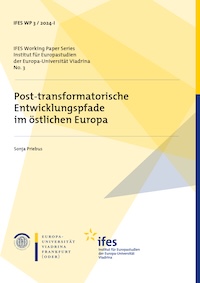
Sonja Priebus: Post-transformational trajectories in Eastern Europe
Short summary: More than three decades after the political and economic upheavals in Central and Eastern Europe in 1989/90, the region is still often perceived as a homogeneous group of states whose members have undergone similar political developments and are struggling with similar challenges, some of which are related to the socialist legacy. This article examines and typologises the post-transformational trajectories of the European states of Eastern Europe since the completion of their transformations from around 1991/1992 to the present day. The central question is how regime development has proceeded in the states of the region and which development patterns can be recognised. The primary pattern in the regime development of a state in the post-transformation phase is referred to as the post-transformational trajectories (PTEP). Five ideal-typical PTEPs are inductively identified: 1) path-dependent autocratisation; 2) path changes in both directions (from democracy to autocracy and vice versa); 3) the non-consolidation of democracy; 4) path-dependent democratisation and 5) regime cycles. The PTEPs do not primarily record the result (i.e. regime type and regime quality at a certain point in time), but rather the process of regime development. This takes account of the fact that the development in the states was and still is very dynamic in most cases and that this dynamic is not reflected by a mere allocation to regime types, which only represent snapshots. The article shows that the states in the region have undergone very different developments in some cases and that we can therefore by no means speak of a homogeneous group.
Key words: post-transformation, regime dynamics, trajectories, democracy, autocracy
The IFES Working Papers Series is designed to disseminate initial results of ongoing research projects prior to publication in order to promote the exchange of ideas and academic debate. The papers are peer-reviewed and discussed at the IFES research seminar.
Lunch Lecture: Why did Trump win (at such scale)?
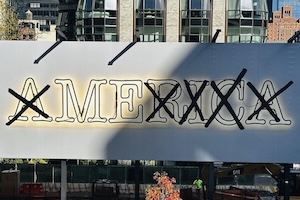
21 November 2024
1:00-2:00 pm
online, Zoom
Lunch Lecture: Why did Trump win (at such scale)?
The Viadrina Institute for European Studies (IFES) invites you to the following event as part of the Lunch Lectures series:
Sascha Münnich (EUV) in conversation with Randall Halle (Pittsburgh).
The result of the presidential election in the USA was in some ways to be expected and yet it came as a shock to many people: How was Donald Trump able to prevail against Kamala Harris by such a clear margin? What factors explain this popular support and, above all, what failures or mistakes by the ruling Democratic Party and its campaign strategy could have contributed to this outcome?
Sascha Münnich and Randall Halle will discuss these questions with each other and with the audience from a social and cultural science perspective and analyse them on the basis of current surveys and their experiences on the ground: What can we learn from this election, including for the future of Europe?
The discussion will be held in English, questions can be asked in German.
First Annual ValEUs Conference: The Contestation of European Values from Afar
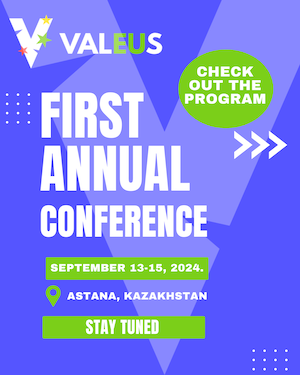
13-15 September 2024
First Annual ValEUs Conference: The Contestation of European Values from Afar
European values play a significant role in shaping the attachment of citizens and elites to the European Union (EU). They are central to the EU's self-definition of where it stands. And they set the orientation of its foreign policy. Yet far from being universally accepted and promoted, the EU's goals have increasingly been questioned. What is the actual role of the EU's values? Are they too broad or too narrowly defined; are they at times unable to generate a unique civic identity for the European people? Do they provide the EU a unique voice on the global stage, or have they instead led the EU to marginalise itself? Is the EU able to properly fulfil its own mandates? Does the EU actually live up to the values it promotes?
If many of these contestations have been raised from within the EU, too little attention has been given to how they are perceived in non-European contexts. The goal of the first ValEUs Conference is an analysis of the ways individuals, groups, and elites in American, Asian, African, and Middle Eastern countries perceive these values and, in return, how these external contestations are understood by European elites. Are these values perceived as hints of Europe's former colonialism? What role do they play in the resurgence of Russia's Slavophile legacy and the country's aggressive foreign policy? In light of what appears to be tomorrow's world, can we expect European values to appeal beyond the EU's formal structure or instead to increase the gap with non-European nations? Do these values have the potential to transcend cultural and civilizational differences, or are they instead a source of Europe's marginalisation?
The investigation of these questions (among others) will be integral to the First Annual ValEUs Conference. This conference will be held at Nazarbayev University, located in Astana, Kazakhstan, from September 13-15, 2024.
For more details, please check the conference programme or visit https://valeus.eu/
Agnieszka Mrozik: Book Discussion
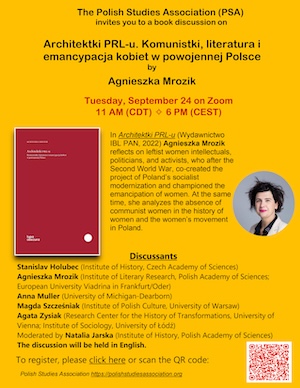
The Polish Studies Association (PSA) invites you to the following book discussion:
24 September 2024
6 pm (cest) on Zoom
Architektki PRL-u. Komunistki, literatura i emancypacja kobiet w powojennej Polsce (Female architects of communist Poland: Communist women, literature and women's emancipation in post-WWII Poland) by Agnieszka Mrozik
In Architektki PRL-u (Wydawnictwo IBL PAN, 2022) Agnieszka Mrozik reflects on leftist women intellectuals, politicians, and activists, who after the Second World War, co-created the project of Poland's socialist modernisation and championed the emancipation of women. At the same time, she analyses the absence of communist women in the history of women and the women's movement in Poland.
Discussants:
Stanislav Holubec (Institute of History, Czech Academy of Sciences)
Agnieszka Mrozik (Institute of Literary Research, Polish Academy of Sciences; European University Viadrina in Frankfurt/Oder)
Anna Muller (University of Michigan-Dearborn)
Magda Szcześniak (Institute of Polish Culture, University of Warsaw)
Agata Zysiak (Research Centre for the History of Transformations, University of
Vienna; Institute of Sociology, University of Łódź)
Moderated by Natalia Jarska (Institute of History, Polish Academy of Sciences)
The discussion will be held in English. To register, please click here.
Border controls between Frankfurt (Oder) and Słubice - A scientific survey
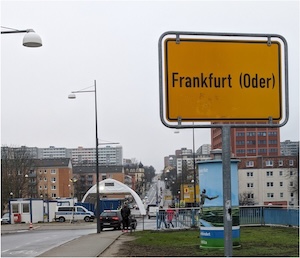
16 July 2024
1:00-2:00 pm
GD lecture theatre 04, Gräfin-Dönhoff-Building
Border Controls between Frankfurt (Oder) and Słubice - A Scientific Inventory
In cooperation with the Viadrina Center B/ORDERS IN MOTION, this present-day analysis at lunchtime/research factory is dedicated to the ongoing controls at the German-Polish border and their effects in Frankfurt (Oder).
With Dr Markus Engler (DeZiM) and Lea Sophie Christinck (EUV/ DeZiM),
authors of the report on the status of border controls at the German-Polish border
The temporary stationary controls introduced by the Federal Ministry of the Interior at the borders with Poland, the Czech Republic and Switzerland also affect the German-Polish border crossing in Frankfurt (Oder) and Słubice. Since October 2023, the Federal Police have been carrying out the measure at the city bridge, which has been extended several times. The stated aim of the checks is to curb "irregular migration" and combat smuggling by preventing unauthorised entry attempts before they enter the country. The measures have been criticised in various ways. While some criticise the measures for having too little or no effect, others criticise the risk of discrimination and racial profiling during implementation.
What consequences can now be recognised in practice? The Green Party parliamentary group has commissioned an expert report to assess the situation. With our guests and authors of the study Marcus Engler and Lea Sophie Christinck from the Centre for Integration and Migration Research Berlin (DeZIM), we would like to discuss the state of affairs from a scientific perspective. How can the measures be categorised in terms of their effectiveness? How are the discourses on security and migration changing? What impact do local restrictions have on the understanding of European values and the right to freedom of movement in Europe?
A report on the event has been published in the Viadrina Logbook and the recording is available on the Viadrina media portal.
Foucault's Reception 40 Years After
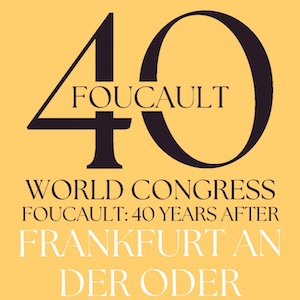
25 June 2024
4:15-7:45 pm
GD 102, Gräfin-Dönhoff-Building
Foucault's Reception 40 Years After
On the occasion of the 40th anniversary of Michel Foucault's death in 1984, the IFES organised two activities dealing with his work and its ongoing and productive reception. The event was part of the World Congress Foucault: 40 Years After. Here you can watch the video recording of part 1 and part 2 of the event.
Part 1: Foucault in Research and in Class: Teachers & Students Talk
4:15-5:45 pm
In the first part, teachers and researchers from the Faculty of Cultural Studies will exchange views with each other and with students on the influence of Foucault on their own work: How have we received his work? Which text has particularly influenced us? How have we used Foucault in teaching and research? What does his work mean for cultural studies? The discussion will take place as part of the seminar "Foucault's Futures: Reading and Reception Forty Years After".
Part 2: Foucault in Central and Eastern Europe: Readings and Reception
6:15-7:45 pm
This panel will examine the reception of Foucault's work in Central and Eastern Europe. The discussion will range from an assessment of Foucault's years in Warsaw to the particular readings, debates and uses that his work has provoked in Eastern European countries against the background of their specific political, cultural and intellectual histories: What are the characteristics of this reception? How was it conditioned by the specific historical and political context? How did Foucault's tools contribute to thinking about local social transformations? Which approaches and concepts have received broad attention so far and what future research perspectives have Foucault's writings opened up?
Our guests will give short statements on these questions and then discuss with each other, with members of the faculty and with students.
Magdalena Nowicka-Franczak (Łódź)
Michał Kozłowski (Warsaw)
Balázs Berkovits (Budapest)
Moderation: Estela Schindel (IFES)
Transformations towards sustainability in Brandenburg
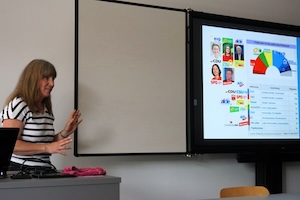
In her two-year teaching research project 'Transformations towards sustainability in the state of Brandenburg', Amelie Kutter and Viadrina students are investigating how actors in the region implement or contest sustainability policy in the areas of water, forest, energy and food. What ideas and practices do experts, governments and local change-makers develop as they establish new ways of producing and living? With the help of document analyses, interviews and field trips, students are guided in a series of research seminars to explore current perspectives on sustainable transformation. The seminars are organised according to the philosophy of challenge-based learning and explore challenges and solution scenarios in collaboration with local stakeholders. Most recently, a Brandenburg agricultural cooperative was supported in the planning of a solar moor project; in the coming semester, scenarios for cross-border climate-friendly mobility and riverbank design will be developed together with the Frankfurt-Słubice Cooperation Centre.
On 10 October, Amelie Kutter spoke about the project with other change-makers at the Pluriversum at Storkow Castle.
Agnieszka Mrozik: Remembering transitions across East Central Europe
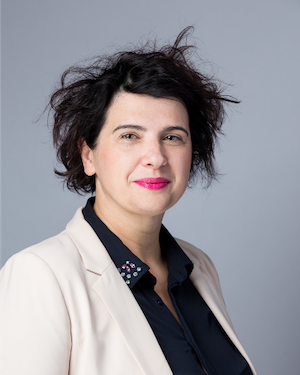
19 June 2024
2:30-4:00 pm
GD 07
Remembering transitions across East Central Europe: Preliminary findings from the field research in Poland and Germany
Presentation by Agnieszka Mrozik (MES) as part of the cultural studies colloquium.
The talk aims to present transitions across East Central Europe.
The talk aims to present, on the one hand, the collaborative research project “Reconstituting publics through remembering transitions: Facilitating Critical Engagement with the 1980–90s on Local and Transnational Scales” – its objectives and the methodology adopted, and on the other hand to share preliminary findings from the fieldwork in Poland (Gdańsk and Łódź) and Germany (Berlin and Eisenhüttenstadt). The project investigates how dialogic memory practices can be facilitated and developed around memories of the 1980-90s political, socioeconomic, and cultural transformations in (post)socialist Europe. By “dialogic remembering,” the research team refers to the processes that create a space for sharing varied memories – voicing difference and dissent, relating to stories of others, and potentially creating new narratives that interlink divergent visions of the past. In my talk, I will not only discuss what memories were shared by the participants of the workshops we organized in four locations in Poland and Germany, as well as the participants of the discussions after the film Crystal Swan (2018), which we screened at the museums we collaborated with, but I will also try to answer the question of whether and how the concept of “dialogic remembering” works in practice.
Agnieszka Mrozik is an Associate Professor of Literary Studies at the Institute of Literary Research of the Polish Academy of Sciences and a guest professor at the European University Viadrina in Frankfurt (Oder) in the summer semester of 2023/24. She is the author of Architektki PRL-u: Komunistki, literatura i emancypacja kobiet w powojennej Polsce [Women architects of the Polish People’s Republic: Communist women, literature, and women’s emancipation in postwar Poland] (Wydawnictwo IBL PAN, 2022) and Akuszerki transformacji: Kobiety, literatura i władza w Polsce po 1989 roku [Midwives of the transformation: Women, literature, and power in post-1989 Poland] (Wydawnictwo IBL PAN, 2012). She has co-authored and co-edited several collective volumes, including Reassessing Communism: Concepts, Culture, and Society in Poland, 1944–1989 (CEU Press, 2021), Gender, Generations, and Communism in Central and Eastern Europe and Beyond (Routledge, 2020), and Historical Memory of Central and East European Communism (Routledge, 2018). Together with Dr Ksenia Robbe (University of Groningen, PI), Dr. Andrei Zavadski (TU Dortmund) and Nora Korte (“Transition Dialogue” network, Berlin) she is working on the research project “Reconstituting Publics through Remembering Transitions: Facilitating Critical Engagement with the 1980–90s on Local and Transnational Scales” (2021–2024), awarded by the Network of European Institutes for Advanced Study (NetIAS) as part of the Constructive Advanced Thinking (CAT) Programme.
Witold Jacorzinsky: Migration from Wittgenstein's perspective
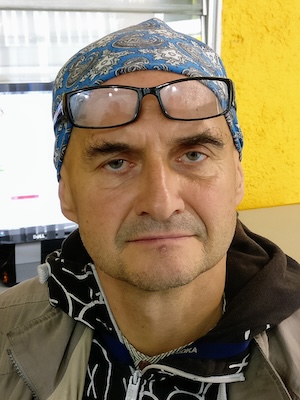
6:15-7:45 pm
HG 201b
Aspect blindness: The problem of migration from Wittgenstein's perspective
Presentation by Witold Jacorzynski as part of the cultural studies colloquium.
In his presentation Witold Jacorzinsky will examine the problem of the immigrant as an Other. The otherness will be considered in its four different senses: the other as no-I, the other as a stranger, the other as an enemy and the other as a fellowman or a neighbour. As a case study Witold Jacorzinsky will analyse the migrants´ situation on the Polish-Belorussian and Mexican-Guatemalan borders. Those two cases will be compared through the use of wittgensteinian concepts such as seeing- as, aspect blindness and family resemblances.
Witold Jacorzynski studied philosophy and anthropology at the University of Warsaw, Poland, and holds a doctorate in humanities. His research focuses on anthropological theory, philosophy and ethnography of the indigenous peoples of Chiapas and Oaxaca. He has been a guest lecturer at the universities of Notre Dame (USA), Leipzig (Germany) and Castilla-La Mancha (Spain). Witold Jacorzynski has been a senior researcher at the renowned anthropological institute CIESAS (Mexico) since 1998. From April to June 2024, he is a visiting researcher at the Institute for European Studies (IFES) as a fellow of the Alexander von Humboldt Foundation.
20 years of EU membership: (future) perspectives from East-Central Europe
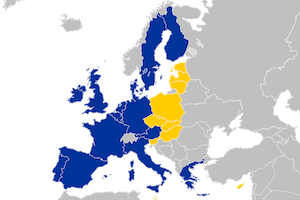
30 April 2024
1:00-2:30 pm
GD 102, Gräfin-Dönhoff-Building
20 Years of EU Membership - (Future) Perspectives from East Central Europe
Panel discussion in cooperation with the Viadrina Center of Polish and Ukrainian Studies (VCPU):
Timm Beichelt (MES)
Wojciech Gagatek (Warsaw)
Anja Hennig (IFES)
Sonja Priebus (IFES)
Falk Flade (VCPU)
Moderation: Susann Worschech (IFES/KIU)
4 May 2024 marks the twentieth anniversary of the accession of ten countries to the European Union. It was the largest simultaneous round of EU enlargement to date. It not only changed the countries that joined, but also the Union itself. The accession of Poland, Hungary, the Czech Republic, Slovakia, the three Baltic states, Slovenia, Malta and Cyprus to the EU was celebrated as European unification and was often interpreted as a "return to Europe", particularly in Poland. However, the image of a "return" obscures the extent to which this enlargement is linked to the successful imitation of Western governance and social models and that the so-called EU enlargement to the east was part of a pan-European transformation process that is still too little recognised and understood today - but which holds important lessons for future rounds of enlargement - especially with regard to Ukraine.
In this panel discussion, Viadrina experts want to look ahead and ask how institutional and social cooperation has developed in a united Europe, how the conditionality of the EU has had an impact and is assessed today, what historical experiences the countries of Central and Eastern Europe have brought to the EU and what political emotions were and are associated with the accession process.
All interested parties are welcome to attend (also with their brown bag lunch...).
The recording of the event is available on the Viadrina media portal.
The Ambivalence of the Liberal-Illiberal Dynamic

In the new issue of the Journal of Illiberalism Studies Anja Hennig addresses questions of the representation of 'illiberal actors' in academic discourse in her essay "The Ambivalence of the Liberal-Illiberal Dynamic". Against the background of specific experiences with the 'Monday demonstrations' in Frankfurt (Oder), Hennig explains, among other things, which actors and statements should be given a platform in the academic context, where and which red lines should be drawn if necessary, and how the academic discourse in general can relate to 'illiberal' actors - questions that are central to the self-positioning of academics.
Annual report 2023
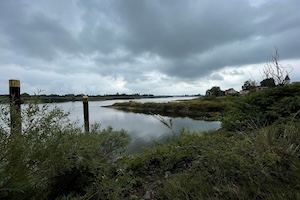
Ukraine and Europe in transition, the Oder crisis, the German-Polish neighbourhood and the state of Brandenburg - these were the topics of activities at IFES last year. Click here for the Annual Report 2023.
Book presentation
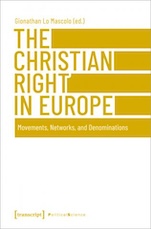
Anja Hennig, Gionathan Lo Mascolo and Marietta van der Tol discuss their contributions in the volume "The Christian Right in Europe: Movements, Networks, and Denominations" published by transcript. The discussion as part of the Blavatnik Book Talk can be listened to here.
Contributions and essays concerning the Oder
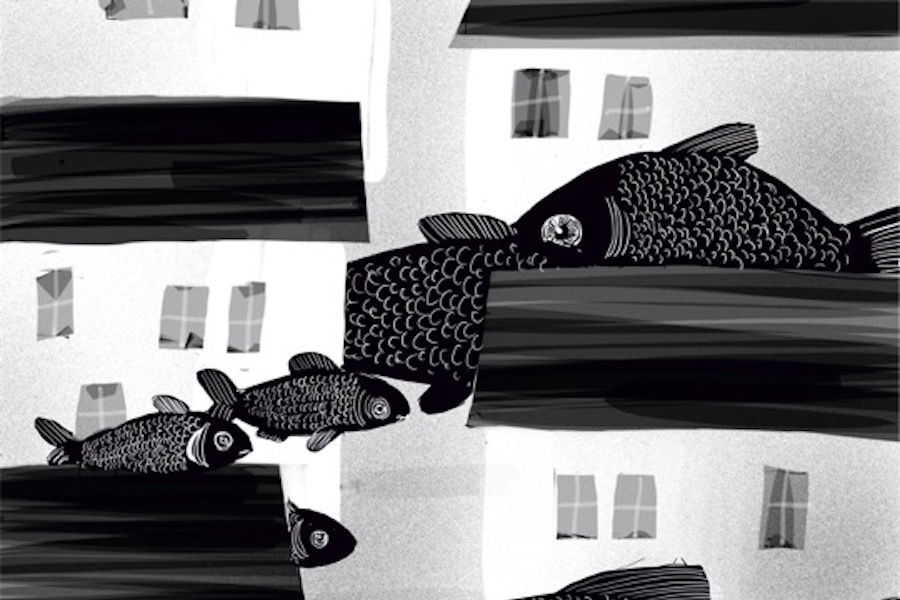
In October 2023, four articles were published on the science blog Polish Studies under the editorship of IFES member Anja Hennig, which address different perspectives on the German-Polish Oder crisis, asymmetries as an analytical perspective for international relations and demands for the rights of nature. Here you can find the articles for reading and reference.
